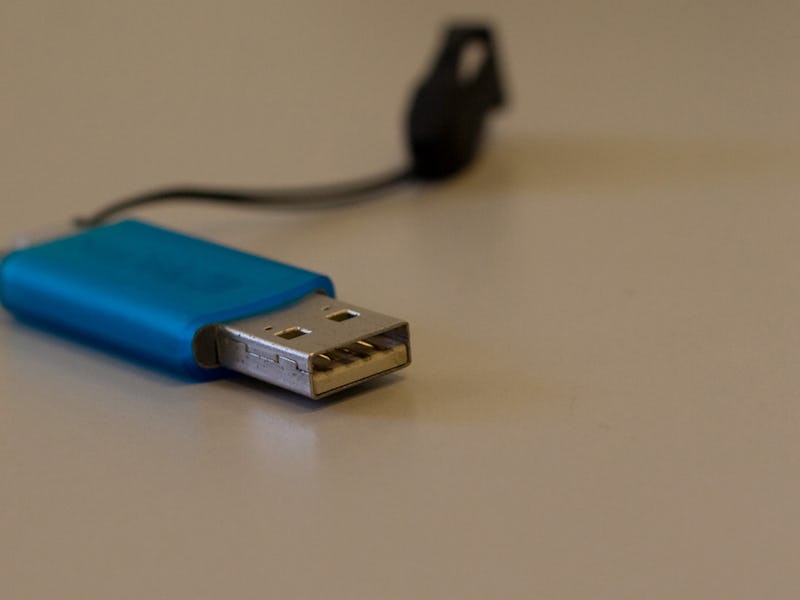People Hang Onto USB Flash Drives Forever Because Losing Data Is Terrifying
People fear, but misunderstand, the myriad consequences of discarding old tech.

Earlier this year a graphic designer named Daniel told a team of researchers that he keeps a box of dead hard drives in his apartment. He couldn’t tell them why he hadn’t thrown them out. And he admitted he still didn’t have any plans to trash them. He understood that he was being tech retentive, but he didn’t understand why. Those researchers, including Jenny Kennedy, a research fellow at the University of Melbourne, and Rowan Wilken, a professor at the Swinburne University of Technology, kept talking to other people in the hopes of finding an answer.
Kennedy and Wilken were particularly interested in USB drives because they’d noticed that unused ones have become ubiquitous. They wanted to understand why people were holding onto these things while throwing out lower tech information technologies, like mail and packaging. They spoke with 14 individuals, all of who were reluctant to dispose of their small data-storage mechanisms — even when they didn’t work anymore — and formulated a theory for a paper they published in Disposable Technologies.
“We definitely have emotional connections to technologies,” Kennedy told Inverse. “Whether it is a connection to the device itself because of what it was used for, the investment of time or money in its initial procurement, it being seen to represent a significant moment in time and relations to others, or the memories it conjures up, many people find it hard to let technology go.”
Part of the reason for this, Kennedy explains, is environmental. Her subjects had good reason to think that they shouldn’t trash tech unless they felt doing so was completely necessary. The subjects didn’t have the facts at hand, but there was an awareness of the size of Earth’s electronic waste problem, which looked like 46 million tons of metal and plastic back in 2014 and is expected to creep closer to 70 million tons by 2017. Electronic waste is the fastest growing trash in the world, making the air toxic and exposing deleterious chemicals to the environment. According to Wired, 70 to 80 percent of old tech goes to landfills.
That’s why places like New York State now legally forbid its citizens to throw away electronics. The option is to go to special e-waste recycling spot — or keep the chargers to devices you lost years ago.
Electronic waste in China.
But it’s not just conscientiousness. Laziness is a key issue. If you don’t know how to recycle electronics, you can obviously use another one of your electronics and Google how to do it. But are you going to drive somewhere to throw away your USB port? Probably not.
“I think people hold on to devices until the ‘right time’ such as when they accumulated sufficient e-waste to warrant a trip to the dump, when they are motivated by other factors such as moving, or waiting for that future day when they have spare time and inclination,” says Kennedy.
The people in Kennedy and Wilken’s study were also afraid of what will happen to their data if they do hand in their USB. Again, if people sat down and figured out how to erase their hard drives, they wouldn’t have to worry about this. Yet a willingness to erase the data hardly ever came up in interviews. People debated with themselves whether hard drives that could no longer be accessed could hold data and expressed a reluctance to part with them.
“I’m a bit concerned of throwing something,” Alex, a web manager, told Kennedy in their interview. “Unless I completely stripped it, which I couldn’t be bothered doing, I don’t want to toss this in the rubbish because it’s not very environmentally cool — but then I wouldn’t want to give it to a digital recycler because who knows what happens to the data. So yeah, I reckon I’d probably keep them.”
A Vodafone LTE high-speed USB dongle.
But to simply blame laziness would, again, be an oversimplification: People are, in general, deeply concerned about data security. This is a trend that’s only growing: In 2014, Americans were more afraid that their personal data would get hacked than they were about getting murdered. Pew Research says that people Americans are increasingly becoming more anxious about their privacy — especially when it comes to digital technologies. A 2016 poll found that 74 percent of Americans said it was “very important” to them that they were in control over who could access information about them.
Embedded within this fear of a nameless hacker capable of grabbing data at will — unsurprising considering the recent awareness of the data collection conducted by the NSA and the rise of hacker groups like Anonymous — is confusion. Many people don’t understand what data is being taken from them, who is taking it, and how that happens. Kennedy’s and Wilken’s subjects, mostly Australians, expressed concern that someone would find discarded drives and do something with the data on them.
This fear isn’t likely to dissipate in the near future, so the problem of tech waste may be the rare issue that can’t be solved with education. The better solution, Kennedy suggests, is for companies to stop putting out barely differentiated new products and, instead, focus on technology that can itself be improved. This won’t help us much with our old thumb drives, but it will make sure we buy less new crap.
“We will hopefully see growing ethically-conscious consumption practices and pressure on technology companies to produce devices that can be upgraded,” says Kennedy. “As the turnover of devices becomes ever more rapid, I really hope we will see more of a pushback against this trend.”